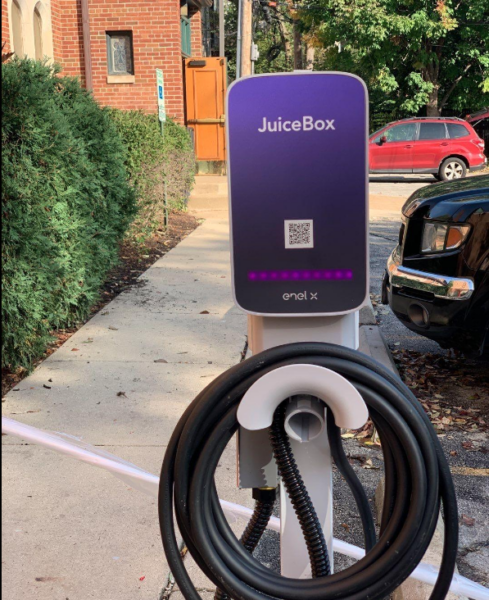
St. Paul & the Redeemer Episcopal Church has the only public charging station on Chicago’s South Side outside of chargers in private parking garages. Photo:
Courtesy of Art Burton
[Religion News Service] As more drivers make the decision to switch from gas-powered cars to electric vehicles, places to power them remain few and far between in large parts of the country. And with the Inflation Reduction Act of 2022 incentivizing clean energy and electric cars, as well as providing investments for green technology, the demand will only increase.
Churches, with their large parking lots that often sit empty during the week, could help provide a solution.
Houses of worship exist in every community and are usually centrally located, making them ideal partners for expanding EV access, according to Andrew Fox, chairman and CEO of Charge Enterprises Inc., which specializes in electricity and communications infrastructure.
It’s why the company has chosen to partner with the Baltimore-Washington Conference of the United Methodist Church to install EV charging stations on church campuses throughout the D.C. region.
Churches “tend to be centrally located, and they offer plenty of access. Sundays might be the most challenging time to charge at a church; however, the rest of the week likely offers plenty of opportunity,” said Fox in a recent press release announcing the partnership.
BWC’s treasurer, Paul Eichelberger, said that as drivers continue to make the switch to electric vehicles, churches can make a significant impact by installing stations in rural and urban areas to meet growing community needs and to serve neighbors outside the church walls.
“They start thinking about what ministries they might be able to bring to somebody who’s sitting in their parking lot for 15 minutes charging their car,” Eichelberger said.
Charge Enterprises and the BWC are still determining where to install EV stations among the more than 600 churches within the conference. More than 100,000 EVs are registered throughout the D.C. region and, according to the Maryland Department of Transportation, more than 60,000 EVs are registered across the state.
Churches in other major metropolitan areas across the country have started offering similar services to their neighborhoods.
The Rev. Catherine Healy, rector of St. Paul & the Redeemer Episcopal Church in Chicago, Illinois, partnered with a local nonprofit, Community Charging, to provide an accessible and affordable charging station on the city’s South Side. She says the charging station is still the only publicly available one in the area outside of chargers in private parking garages.
“We are in a position where we can provide a service that no one else is providing and that seems really valuable to us,” Healy said.“Almost instantly it started getting near-daily use.”
The charging station serves as a small revenue generator for the church, which charges $0.15 per kilowatt hour, averaging a $40 profit a month. But, Healy said, its real purpose is as a physical representation of the church’s commitment to environmental stewardship and caring for people in the neighborhood. In addition to the station, the church made the switch to LED lighting inside the building and hosts community discussions on energy efficiency.
“A lot of people were curious about this new gadget in the parking lot, so it’s opened up possibilities for talking with people about electric vehicles and the larger environmental pros and cons of EVs replacing fossil fuels,” Healy said.
For Jonathan Lacock-Nisly, the director of faithful advocacy for the D.C.-area chapter of Interfaith Power and Light, installing charging stations is one action among many that churches can do as the country works to shift toward cleaner transportation. Interfaith Power and Light, a national nonprofit that helps churches respond to climate change, also encourages congregations to minimize their carbon footprint through energy-saving efforts like switching from gas to electric home appliances.
He also sees these efforts, along with local advocacy work for clean infrastructure, as tangible expressions of faith that church leaders can rally their congregations around, especially younger generations who are eager to see a decrease in dependency on fossil fuels. A 2021 Pew Research Center survey found that the majority of millennials and Gen Z populations are in favor of phasing out gas-powered vehicles by 2035.
“These individual actions are not just an important representation of our values, but are a building block to the collective action we need for larger change,” Lacock-Nisly said.










